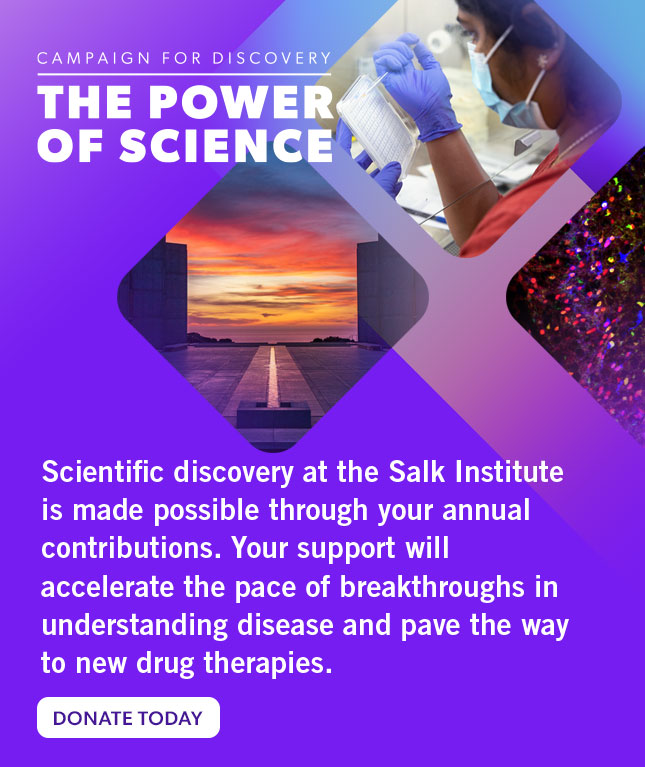When mice with atopic dermatitis—a common type of allergic skin inflammation—are treated with drugs that target the immune system, their thickened, itchy skin generally heals quickly. Yet the same treatment in obese mice only worsens their skin, according to a study by Professor Ronald Evans, Associate Professor Ye Zheng and collaborators from Gladstone Institutes and UC San Francisco. Obesity changes the molecular underpinnings of allergic inflammation, both in mice and humans, the team found. Their study demonstrates how obesity can change the immune system and how available drugs might be able to improve health outcomes for people with obesity.
Read News ReleaseDiscoveries
Tiny worms make complex decisions, too
Whether it comes to foraging, defending a vital resource or seeking a mate, animals need to weigh options before picking a course of action. Scientists have spent decades trying to understand how animals make decisions by focusing on the brain cells and connections that might be involved. Associate Professor Sreekanth Chalasani and first author Kathleen Quach are taking a different approach—analyzing behavior, not neurons. They were surprised to find that worms can take multiple factors into account and choose between two different actions, despite having only 302 neurons compared to approximately 86 billion in humans. The findings provide a framework for understanding how decisions are made in more complex systems, such as humans.
Read News ReleaseHow the brain encodes social rank and “winning mindset”
Most social animals, humans included, organize themselves into hierarchies that guide individual behavior. For instance, if you’re reaching for the last piece of pizza at a party and you see another hand going for it at the same time, your next move probably depends both on how you feel and to whom the hand belongs. Your little sister—you might go ahead and grab the pizza. Your boss—you’re likely to step back and give up the slice. But if you’re hungry and feeling particularly confident, you might go for it. Professor Kay Tye, co-first authors Nancy Padilla-Coreano and Kanha Batra, and colleagues have made inroads in uncovering how mammalian brains encode social rank and use that information to shape our behaviors, such as whether to fight for that last pizza slice.
New technology enables an unprecedented glimpse inside single brain cells
Professor Joseph Ecker and colleagues have developed a new genomic technology to simultaneously analyze the DNA, RNA and chromatin—a combination of DNA and protein—from a single cell. The method, which took five years to develop, is an important step forward for large collaborations where multiple teams are working simultaneously to classify thousands of new cell types. The new technology will help streamline analyses and provide an open-source cell catalog to better understand neurodegenerative diseases, such as Alzheimer’s.
Read News ReleaseThe protein that keeps the pancreas from digesting itself
Every day, your pancreas produces about one cup of digestive juices, a mixture of molecules that can break down the food you eat. But if these powerful molecules become activated before they make their way to the gut, they can damage the pancreas itself—digesting the very cells that created them, leading to the painful inflammation known as pancreatitis and predisposing a person to pancreatic cancer. Now, Professor Ronald Evans, co-first author Tae Gyu Oh and colleagues have discovered that a protein called ERR gamma plays a crucial role in preventing pancreatic autodigestion in mice. What’s more, they discovered that people with pancreatitis have lower levels of this protein in cells affected by inflammation.
Read News ReleaseCellular rejuvenation therapy safely reverses signs of aging in mice
Age may be just a number, but it’s a number that often carries unwanted side effects—from brittle bones and weaker muscles to increased risks of cardiovascular disease and cancer. In new research, Professor Juan Carlos Izpisua Belmonte and co-first author Pradeep Reddy, in collaboration with Genentech, a member of the Roche group, have shown that they can safely and effectively reverse the aging process in middle-aged and elderly mice by partially resetting their cells to more youthful states. This approach may provide the medical community with a new tool to restore tissue and overall health by improving cell function and resilience in conditions such as neurodegenerative diseases.
Cellular regeneration therapy restores damaged liver tissue faster than ever
Mammals can’t typically regenerate organs as efficiently as other vertebrates, such as fish and lizards. But now Professor Juan Carlos Izpisua Belmonte, co-first authors Tomoaki Hishida and Mako Yamamoto, and colleagues have found a way to partially reset liver cells to more youthful states—allowing them to heal damaged tissue at a faster rate than previously observed. The results reveal that the use of reprogramming molecules can improve cell growth, leading to better liver tissue regeneration in mice. The work has implications for treating infection, cancer and genetic liver diseases, as well as metabolic diseases such as nonalcoholic steatohepatitis (NASH).
Read News ReleaseAn ocean in your brain: interacting brain waves key to how we process information
For years, the brain has been thought of as a biological computer that processes information through traditional circuits, whereby data zips straight from one cell to another. While that model is still accurate, a new study led by Professor Thomas Albright and Staff Scientist Sergei Gepshtein shows that there’s also a second, very different way that the brain parses information: through the interactions of waves of neural activity. The findings will help researchers better understand how the brain processes information.
Read News ReleaseWhy hungry worms take risks
Whether it’s making rash decisions or feeling grumpy, hunger can make us think and act differently—“hangry,” even. But little is known about how hunger signals in the gut communicate with the brain to change behavior. Associate Professor Sreekanth Chalasani, co-first author Molly Matty and colleagues are using worms as a model to examine the molecular underpinnings that help explain how hunger makes an organism sacrifice comfort and make risky decisions to get a meal. Their latest findings reveal that proteins in intestinal cells move dynamically to transmit signals about hunger, ultimately driving worms to cross toxic barriers to reach food. Similar mechanisms may also occur in humans and could explain how we prioritize basic needs over comfort.
Read News ReleaseFeatured Stories
 What’s so special about Salk? Everything.An exceptional history, visionary design and trailblazing faculty make the Salk Institute unique among elite research institutions. And we’re just getting started. Today, Salk faculty are daily making discoveries that may one day turn the tide on Alzheimer’s, aging, cancers, climate change and more.
What’s so special about Salk? Everything.An exceptional history, visionary design and trailblazing faculty make the Salk Institute unique among elite research institutions. And we’re just getting started. Today, Salk faculty are daily making discoveries that may one day turn the tide on Alzheimer’s, aging, cancers, climate change and more. Margarita Behrens—Master of brain circuitsGrowing up in Chile, Research Professor Margarita Behrens was torn between becoming an architect and a scientist. She ultimately decided to pursue biochemistry. Now at Salk, Behrens studies how neurons develop in the brain. Her findings have implications for neurodevelopmental disorders such as schizophrenia and autism.
Margarita Behrens—Master of brain circuitsGrowing up in Chile, Research Professor Margarita Behrens was torn between becoming an architect and a scientist. She ultimately decided to pursue biochemistry. Now at Salk, Behrens studies how neurons develop in the brain. Her findings have implications for neurodevelopmental disorders such as schizophrenia and autism.
 Julie Auger—Shaping Salk’s science through shared resourcesJulie Auger’s mother was at a conference in the mid-1980s when she met Jonas Salk. She got his autograph and mailed it to Auger with a note saying, “Don’t ever stop trying to achieve your dreams.” Auger took her mom’s advice, and today she is the executive director of Research Operations at the Salk Institute.
Julie Auger—Shaping Salk’s science through shared resourcesJulie Auger’s mother was at a conference in the mid-1980s when she met Jonas Salk. She got his autograph and mailed it to Auger with a note saying, “Don’t ever stop trying to achieve your dreams.” Auger took her mom’s advice, and today she is the executive director of Research Operations at the Salk Institute. Gaurav Mendiratta— Using math to solve cancerJumping from theoretical physics to cancer research with no prior training in biological sciences wasn’t an easy transition for Gaurav Mendiratta. Couple this with a move across the world and the birth of his first child shortly after starting his postdoctoral training in a newly opened laboratory—Mendiratta had his work cut out for him.
Gaurav Mendiratta— Using math to solve cancerJumping from theoretical physics to cancer research with no prior training in biological sciences wasn’t an easy transition for Gaurav Mendiratta. Couple this with a move across the world and the birth of his first child shortly after starting his postdoctoral training in a newly opened laboratory—Mendiratta had his work cut out for him. A trailblazer’s lasting legacy: Ursula Bellugi bridged humanity and scienceDespite being a world-renowned, award-winning scientific pioneer, Distinguished Professor Emerita Ursula Bellugi didn’t like to say she was smart. Instead, she credited her tremendous success to her insatiable curiosity and her willingness to ask the right questions. This past spring, the world lost a true trailblazer.
A trailblazer’s lasting legacy: Ursula Bellugi bridged humanity and scienceDespite being a world-renowned, award-winning scientific pioneer, Distinguished Professor Emerita Ursula Bellugi didn’t like to say she was smart. Instead, she credited her tremendous success to her insatiable curiosity and her willingness to ask the right questions. This past spring, the world lost a true trailblazer.




















































